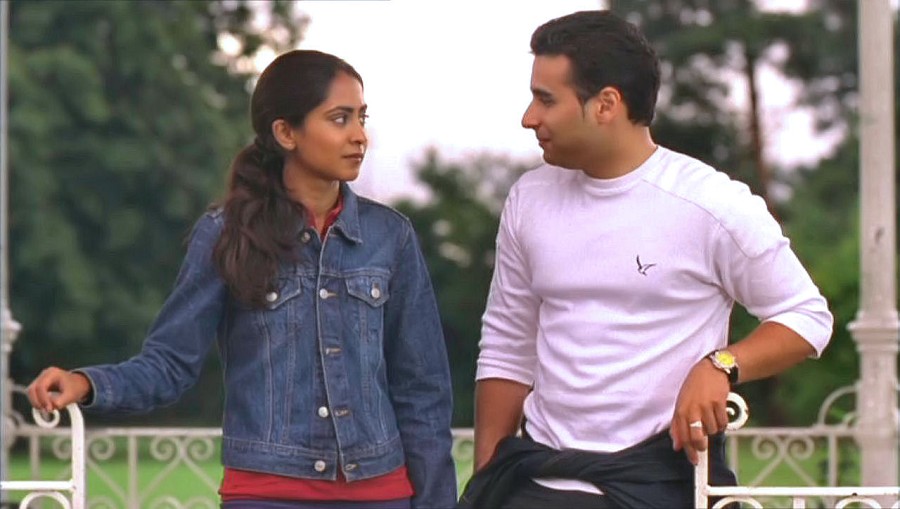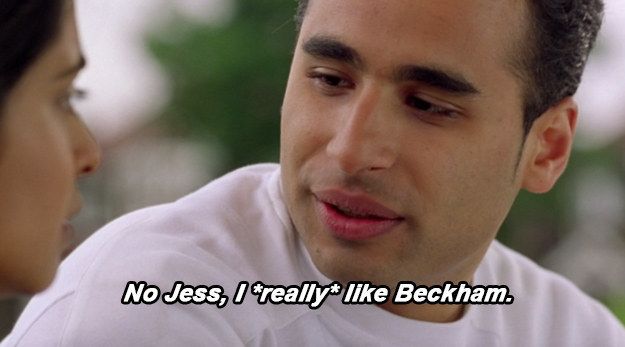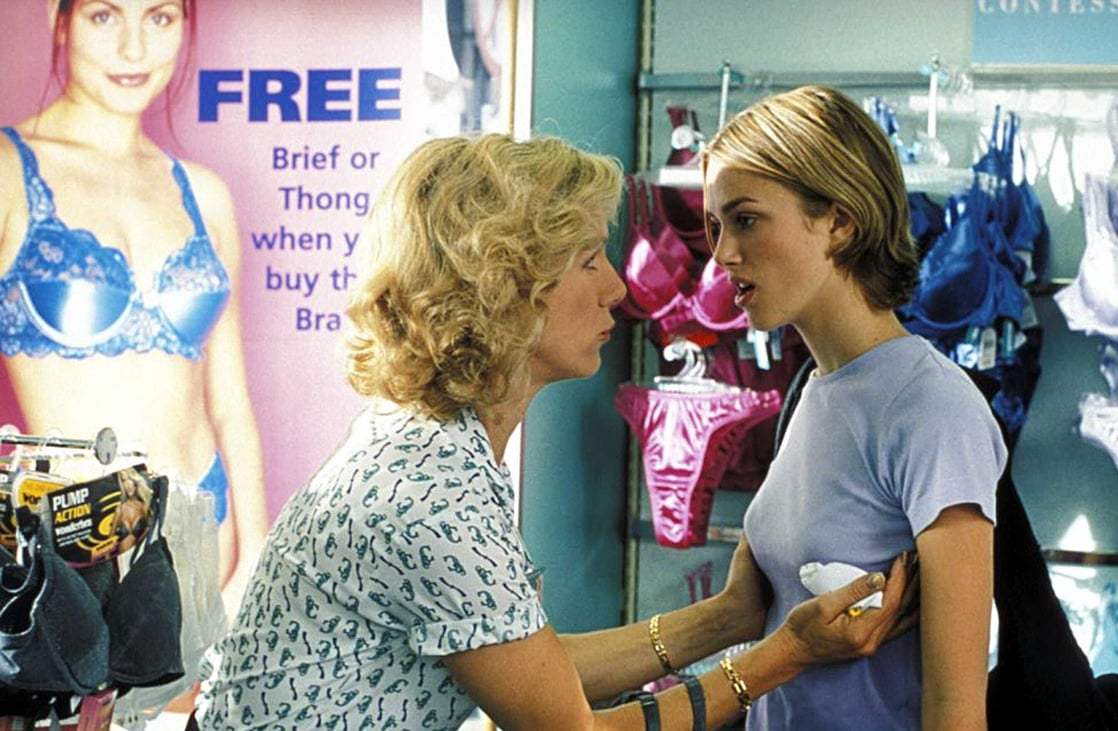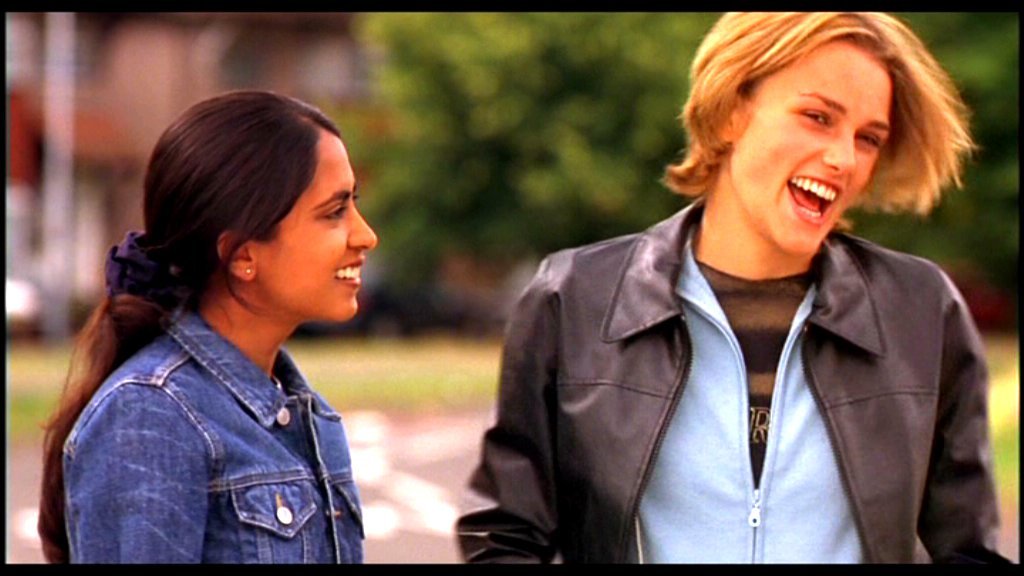a series by Christopher James looking at the 'Gay Best Friend' trope
 Jess (Parminder Nagra) and Tony (Ameet Chana) are best friends and soccer players who both experience struggles within their strict Indian community.In honor of the “big game” yesterday, I wanted to see if there were any sports movies that would fit the Gay Best Friend column. The venn diagrams were slim, until I stumbled upon the crowd-pleasing surprise 2003 hit Bend it Like Beckham. Gurinder Chada’s sports romantic comedy grew from an initial release in just six theaters and ended up grossing $32 million domestically and $76 million worldwide. The film follows a young Indian girl, Jess (Parminder Nagra) who defies her family’s wishes and pursues playing on an all girls soccer team. What follows is an interesting and frank examination of cultural and gendered norms around sports.
Jess (Parminder Nagra) and Tony (Ameet Chana) are best friends and soccer players who both experience struggles within their strict Indian community.In honor of the “big game” yesterday, I wanted to see if there were any sports movies that would fit the Gay Best Friend column. The venn diagrams were slim, until I stumbled upon the crowd-pleasing surprise 2003 hit Bend it Like Beckham. Gurinder Chada’s sports romantic comedy grew from an initial release in just six theaters and ended up grossing $32 million domestically and $76 million worldwide. The film follows a young Indian girl, Jess (Parminder Nagra) who defies her family’s wishes and pursues playing on an all girls soccer team. What follows is an interesting and frank examination of cultural and gendered norms around sports.
So who’s the Gay Best Friend? Don’t worry, we’re getting to that…
To talk about Tony, we have to first spoil his big coming out moment. The film sets Tony up as a friend of Jess who lets her play soccer with the boys. Both his family and her family see them as a potential match, but neither are interested in each other. Eventually Jess needs a beard to distract from her burgeoning romance with her Irish soccer coach, Joe (Jonathan Rhys-Meyers). This is what leads to Tony finally coming out to Jess.
 Very Samantha Jones voice: "I'd like Beckham to Bend Me Like That."
Very Samantha Jones voice: "I'd like Beckham to Bend Me Like That."
Tony: Look, Jessie. You can't plan who you fall for. It just happens. I mean, look at... Posh and Becks.
Jess: Well, Beckham's the best.
Tony: [chuckles] Yeah! I really like Beckham too.
Jess: Well of course you do. No one can cross a ball or bend it like Beckham
Tony: [shakes head] No, Jess. I *really* like Beckham.
Jess: What? You mean...
[incredulous scoff]
Jess: But you're Indian!
2003 was well before “No H8” and “it gets better” narratives around coming out. Upon rewatch, it was fascinating how pricky Jess’ response was. It’s not that she’s homophobic or dislikes gay people. Tony was a boy who played soccer, he didn’t strike her as a gay person because he didn’t fit her preconceived notions. Additionally, she finds her own struggles reflected in his coming out. The first thing she jumps to is “but you’re Indian,” acknowledging that their shared culture will make coming out a hard journey. The reason that that's at the top of her mind is because the conflict in her life at that moment is “my parents will not accept me playing soccer and dating an Irish boy.” This is a common pitfall in representation moments. Having this coming out moment in this movie that has a lot of salient themes for gay people feels correct and relevant. Yet, this moment isn’t used to develop this “gay best friend” into more of a character. It’s to reflect and reinforce the central struggle of the protagonist.
Tony starts to play a pivotal role in the third act of the film, but this still doesn’t allow for further character development. At her sister’s (Archie Panjabi) wedding, Tony helps convince Jess’ father (Anupam Kher) to let her sneak out to play in the pivotal final match. He’s her transportation to and from that climactic match, where Jess and her friend/parallel plot partner, Jules (Keira Knightley), get full ride soccer scholarships in America. He’s helped Jess’ dreams come true, but now she’s worried her parents won’t let her go to America. Independent of Jess, Tony blurts out at a family dinner that he will marry Jess and let her go to school in America. Very quickly, this marriage proposal gets forgotten and is nothing more than a sweet gesture to help a friend. Jess’ father agrees to let her go and everyone lives happily ever after.
It’s worth noting that Tony is a primary force for getting Jess what she wants, almost in a fairy godmother type way. Yet, in return, Tony doesn’t get or want anything. Keep in mind, he is still only out to Jess. He’s still living in the closet and does not seem to have any plans to come out to his family anytime soon. In service for his friend, Tony was willing to marry Jess and intertwine their lives together forever. Movies can only contain so much plot, and at just under 2 hours Bend It Like Beckham likely couldn’t take too much more padding. Yet, Tony is an interesting character this is short changed specifically because our culture has a shorthand for the gay best friend stock character. We aren’t used to seeing them fleshed out at this point in history. They’re window dressing. For a movie with interesting themes and insight into Indian culture, there surely could have been more to him than merely conflict solver.
 Gender expression and sexuality is a key conflict in our other main storyline, that of Jules (Keira Knightley) and her ultra-feminine mother, Paula (Juliet Stevenson).
Gender expression and sexuality is a key conflict in our other main storyline, that of Jules (Keira Knightley) and her ultra-feminine mother, Paula (Juliet Stevenson).
Though Tony is a small role in the film, discussions about gender and sexuality happen throughout the movie, particularly around Keira Knightley’s Jules. She’s driven to play soccer and is afforded the opportunity to play on the team without complication thanks to her privilege and supportive Dad, Alan (Frank Harper). However, her and her Mom, Paula (Juliet Stevenson), frequently butt heads. Paula wants Jules to be a traditional girl and bristles at her daughter’s more stereotypically masculine interests. Throughout the movie, Paula ping pongs between forcing Jules into this cookie cutter feminine image or trying to lean in and engage with Jules’ actual interest in soccer. At one point, Jules walks in on Paula being quizzed by Alan on soccer rules, as Paula has vowed to make more of an effort to support Jules’ soccer career. Yet, these great strides lead to backsliding when Paula begins worrying Jules is gay.
Paula: That's why she's been so depressed lately cos' that Jess broke her heart! She's in love. With a girl!
Alan: You're jumping to all the wrong conclusions
Paula: But I heard her! No wonder she never looked twice at the Kevin or brought any boys home. I tried to get her nice clothes, you know we've had some lovely prints in this summer you know in swimwear and sarongs and that. She never wants to go shopping with me. It was terrible what they did to that George Michael going on about him and his private business in the papers like that! Oh No!
Alan: George Michael is still a superstar and you still listen to Wham!
Jess and Jules are fighting over their hunky coach, Joe, but Paula thinks they are in a lover’s quarrel. This initial shock doesn’t lead to understanding though. After misinterpreting a quick kiss between teammates after Jess and Jules make up in the big game and earn scholarships, Paula gets triggered into rage mode. She drives with Jules to confront Jess at Jess’ sister’s wedding, hurling homophobic insults at her in front of her family.
Paula: Get your lesbian feet out of my shoes!
Jules: Mother, just because I wear trakkies and play sport does not make me a lesbian!
---------------------------
Jules: Anyway being a lesbian's not that big a deal
Paula: Oh no of course not sweetheart no. I mean I've got nothing against it. I was cheering for Martina Navratilova as much as the next person.
Many parents go on a journey confronting their own prejudices when they learn their child is gay. Paula obviously wants a good relationship with Jules. She just has trouble pushing herself out of her comfort zone. Up to this point the film has done a fine job examining the drama within this fractured mother-daughter relationship and the steps it takes to bridge this divide. However, playing this confrontation and outing for laughs feels like the exact wrong move. We believe the response, as Paula has been lashing out when things don’t go her way. Yet, this is treated like an endpoint for these characters, when in reality they have a long way to go.
 In all fairness to Jules' Mom, it would've been great to have Jess and Jules fall for each other. Maybe that happened when they went to Santa Clara?
In all fairness to Jules' Mom, it would've been great to have Jess and Jules fall for each other. Maybe that happened when they went to Santa Clara?
Bend It Like Beckham serves as an interesting time capsule for 2003 in terms of prevailing attitudes to queer characters. People were very much in this state of “gay panic,” where you didn’t want to draw attention to any action or interest that could be construed as queer. This very much included the world of female sports. Playing soccer and developing close relationships with your fellow female teammates could lead to questions and assumptions from the judgmental gossips. We don’t learn nearly enough about Tony, but he never codes himself as gay in his interactions with his friends or family. Even though he knows his sexuality, he’s not comfortable sharing or expressing that part of himself amidst a world and culture that may not accept him.
Previously in Gay Best Friend
- Toddy (Robert Preston) & Squash (Alex Karras) in Victor/Victoria (1982)
- Sammy Gray (Steve Zahn) in Reality Bites (1994)
- Gareth (Simon Callow) and Matthew (John Hannah) in Four Weddings and a Funeral (1994)
- George Downs (Rupert Everett) in My Best Friend’s Wedding (1997)
- George Hanson (Paul Rudd) in The Object of My Affection (1998)
- Bill Truitt (Martin Donovan) in The Opposite of Sex (1998)
- Robert (Rupert Everett) in The Next Best Thing (2000)
- Patti (Sandra Oh) in Under the Tuscan Sun (2003)
- Nigel (Stanley Tucci) in The Devil Wears Prada (2006)
- Wallace Wells (Kieran Culkin) in Scott Pilgrim vs the World (2010)
- Abby Gerhard (Sarah Paulson) in Carol (2015)
- Duncan (Pete Davidson) in Set It Up (2018)
- Jack Hock (Richard E. Grant) in Can You Ever Forgive Me (2018)